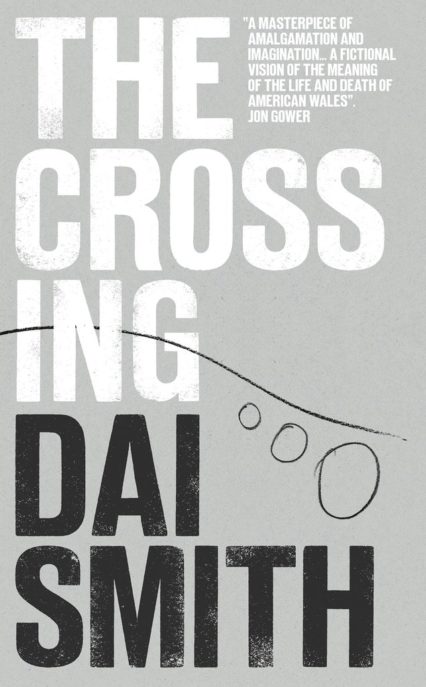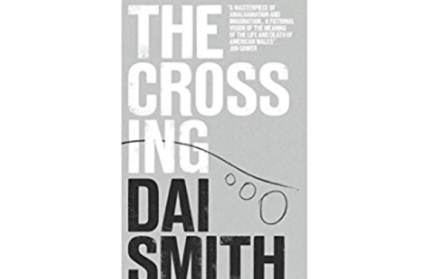Gareth Kent reviews Dai Smith’s intergenerational Welsh Epic, The Crossing, depicting a unique connection between Wales and the United States.
My old man had moved over a hard lifetime from gritty indifferent to trust and hope and back again to a railing anger when what was in reach, for control, had been let slip, and politics proved inadequate when its hinterland of support shrivelled. His own lost and found father had scorned airy idealism and secured the future for himself, anchoring it in the management of the affairs of men and women whose lot was indeed to labour, but not, he would say, in vain.
 The Crossing is an ambitious temporal epic that bridges the past with the present, connecting Wales with the United States in its documentation of our small nation’s crumbling ambitions, as well as the socio-economic costs inflicted upon future generations by the hammer of big business. The result is a socio-politically disillusioned culture encumbered by an ever-increasing social disconnection, where the few nebulous attempts to recreate the past through a notion of ‘regeneration’ is figured as the sole means of restoring the nation’s ambitions and utopian impulse. Here, Wales is blanketed in a perpetual malaise, where idealistic notions such as responsibility and ambition are effectively substituted for a culture of apathetic ennui, cheap alcohol, tawdry entertainment, and collective political disillusionment.
The Crossing is an ambitious temporal epic that bridges the past with the present, connecting Wales with the United States in its documentation of our small nation’s crumbling ambitions, as well as the socio-economic costs inflicted upon future generations by the hammer of big business. The result is a socio-politically disillusioned culture encumbered by an ever-increasing social disconnection, where the few nebulous attempts to recreate the past through a notion of ‘regeneration’ is figured as the sole means of restoring the nation’s ambitions and utopian impulse. Here, Wales is blanketed in a perpetual malaise, where idealistic notions such as responsibility and ambition are effectively substituted for a culture of apathetic ennui, cheap alcohol, tawdry entertainment, and collective political disillusionment.
The overall primary focus of the novel is centred around once such jaded photographic journalist, Billy, who travels from the United States back home to Wales in search of a woman named Haf who might be his daughter. The central conflict sees Billy return at Haf’s behest, receiving a letter outlining her concerns regarding her mother’s shady business venture for an ‘independent unit for research and development, for business growth and social regeneration’. In some sense, Haf’s political engagement is figured as a burning ember of the socio-political commitment lost during Billy’s generation, and this incites him into travelling back home to assist her in her efforts to expose the suspicious business practices of the project’s directors. Billy’s motive, however, is ultimately an effort to ascertain the truth regarding Haf’s birth, and through doing so, potentially, the truth of Billy’s future.
Billy’s motive, however, is ultimately an effort to ascertain the truth regarding Haf’s birth, and through doing so, potentially, an understanding of his own future.
Billy initially achieved acclaim in his youth through documenting the 1980s miners strikes. Yet, ‘caught between the icy ire and dismissiveness’ of his ‘old man and the despair’ of his ‘generational failure’ of the defeat of the strikes, Billy flees Wales for brighter pastures in the United States. He is reduced to a state of psychological barrenness, his mind decrepit as the relics of Welsh industry, and sojourns across the Atlantic in search of better fortunes in the tell-tale city where fortunes are to be made – New York. And indeed, Billy’s photographic talents continue to award him not only a modicum of success but prestige too. Yet, despite this, Billy’s life remains unfulfilled. His photography undergoes a stylistic shift, and his photos become a metaphorical signifier for his malaise. Not only is Billy disconnected from others in his personal life, he likewise disassociates from his photographic subjects. Billy takes shots of his photographic subjects as divided parts, merely perceiving them objects of enquiry rather than people: ‘Removing their faces was denying their humanity. I had disassembled them into machine-like pieces. I was not seeing anything beyond fragments’.
Despite Billy’s centrality, however, the novel is ultimately a multi-generational work of historical fiction, one that is both complex and compelling in its effectual retelling of both personal and Welsh history: the failures and decline of the mining industry, and the consequential socio-political disconnection of the Welsh people. Although, despite these gloomy overtones, the novel retains the Chandleresque charm that is characteristic of Smith’s work, notably through Billy’s dialogue which is always snappy, and frequently, hilarious.
Indeed, The Crossing offers far more than just a documentation of our cultural malaise. It is equally a reflection on fatherhood, nationhood, memory, authority, and the historical ties that bind us across multiple generations and nations, all packaged in the aesthetic of a Chandleresque thriller with just a hint of Murakami. The novel questions the fallacy of memory as well as probing the soundness of our perception towards history. One example of this concerns the boxing legend, Freddie Welsh, through a viewer’s account of his fight with Jim Driscoll. The Crossing invites us to take another look at the past, with a more critical lens, striving to understand the wider picture beyond simply skimming through historical dates that remain detached and sterilised from personal accounts and lived experience.
Overall, while The Crossing can often feel challenging, it is a novel that is equally rewarding. Some readers may struggle to connect all of the novel’s historical threads together due to the shifting narratives and bewildering historical ties. The Crossing, however, reminds us that this is precisely the point: ‘untangling the threads of lives was, at best, a fraught, uncertain process’, and recorded history is, of course, never quite what it seems. The Crossing successfully shifts through the misty miasma of recorded history as a means of grappling with our contemporary malaise. It invites us to take another look at history, and in doing so, challenge our perceptions towards our cultural memory, allowing us to uncover a fuller picture in a way that is not detached from lived experience, which, in turn, functions as a guiding flame towards healing our cultural malaise.
The Crossing by Dai Smith is Available Now from Parthian Books.
Gareth Kent is a regular contributor to Wales Arts Review.



 Enjoyed this article? Support our writers directly by buying them a coffee and clicking this link.
Enjoyed this article? Support our writers directly by buying them a coffee and clicking this link.








